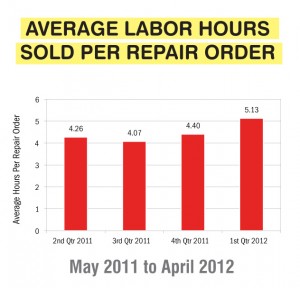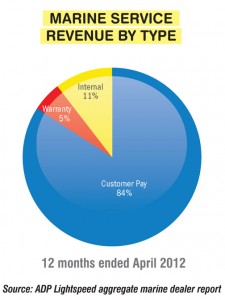Becoming a “Super Tech”

Technical know-how is important for service techs, but today’s marine industry requires a broader skill set.
How important is a marine technician to the health of a dealership today?
“Sales will sell the first boat, but service sells the rest. Our most intelligent people here are our technicians and service personnel,” says Carlton Phillips, the president of Prince William Marina. “These professionals are the backbone of our company.”
That’s impressive praise when you consider this Virginia-based dealership located on 17 acres in the town of Woodbridge has realized growth and success during one of the worst downturns in the marine industry’s history. According to Phillips, Prince William Marina currently owns 46 percent of the market, and that’s up from 34 percent last year. To keep customers satisfied, Phillips employs 25 people in service; nine of them are full-time techs and Phillips wants to hire more.
“We’re selling boats and we’re looking to grow,” he says.
But Phillips, a self-made entrepreneur who began his own career as an auto mechanic, says good technicians are hard to find.
“I want people who are responsible and professional,” he says. “We expect our technicians to make a commitment and devote the time. In December, our average tech billed 17.85 hours per day, which means they had to work on Saturdays and Sundays to get things done. But I believe if you don’t mind working, you can be as successful as you want to be.”
At Prince William Marina, where there are 340 slips and room for another 270 in a boatel, the payback for those who really put their skin in the game is attractive: The average tech makes $80,000 per year, but there is opportunity to gross as much as $125,000 a year through the company’s enviable salary and commission plan.

Phillips, who comes to work in a technician’s uniform each day and will weld and rig alongside his employees, realized the value of good technicians early in his career. When he first bought the marina in 1981, there were more than a dozen boats sitting on the lot that hadn’t been worked on for some time. Within a few weeks, they were repaired with capable hands, and that’s when the business started to grow.
But this hands-on mechanic has tough standards when it comes to hiring and promoting technicians.
What are the skills required for a marine technician to land the best jobs in the industry today, as well as advance their careers and make better pay in the process? To find out, we talked with business owners like Phillips, as well as educators and service professionals who are recruiting and placing top talent. As it turns out, raw technical know-how is just one criterion. Marine techs need a broad skill set, one that includes, among other things, a solid education, the willingness to expand that knowledge base, a tenacious work ethic, a knack for customer relations, some business acumen and the right attitude.
“In some ways, each of our techs is responsible for his own small business,” says Phillips. “On the mechanical end, he’s a jack of all trades, dealing with everything from motor problems to issues with the air conditioning, the generator and GPS. But he also works with builders on warranty claims and with customers on billing, delivery and follow-up. So the tech has to be well rounded and professional. We want the tech working directly with the customer because he’s the one who can really explain what’s wrong and how to fix it.”
Although sources say the job market for marine technicians is relatively strong today, they also note that the standards for these professionals are higher than ever.
“You can’t just show up with a toolbox,” says Valerie Ziebron of VRZ Consulting. “Employers look closely at your certifications and your experience, and they want to know you have a facility for customer relations. Stores that cut back in the recession are now doing more work with fewer people, so it’s not unusual for a marine tech to work closely with the buyers. Those who possess the ability to translate technical speak into a language the layman can understand are priceless.”
The truth is, many marine techs choose the profession because they prefer to spend more time with motors than people, but the pros that build solid careers realize the importance of customer satisfaction. It’s basic math. Happy customers spend more money, and a tech that can tie his time and energy to the shop’s profits will be rewarded.

“I recently met a smart tech who said he was trying to work without blinders,” says Ziebron, who is a Yamaha Marine University instructor. “When he gets on a boat, he no longer focuses solely on the problem he was assigned to fix. He looks around and determines if there are other issues the customer should be aware of. This technician feels the customer has trusted him with his boat, and so he’s responsible if something else breaks.”
Of course, knowing how to fix those sticky problems is a critical skill. But marine technology is always changing and increasingly more sophisticated, which means service professionals have to stay well ahead of the curve.
“A tech who is a voracious learner and who reads on a variety of subjects is very valuable,” says Ziebron. “You have to study on a higher level to advance your career. You have to devote time and energy to product updates and service bulletins, even if a percent of your own paycheck has to go toward it. It’s best to be focused on what you can learn rather than what you earn. That knowledge can launch a career, and for a tech, I think the sky is the limit.”
To emphasize that point, Ziebron notes that many top executives in the marine industry, including presidents of companies, started out turning wrenches. But if the corporate ladder isn’t the goal, there are many other career options for those with mechanical expertise, from tech manual writers, shop foreman and service managers, to entrepreneurial positions as a mobile tech or business owner, like Phillips.
“Keep an open mind,” says Ziebron. “Remember the best learning happens on the job, which is why it’s so important to carefully consider the place you choose to work at. If you get into an efficient and effective shop and that becomes your new normal, the rest of your career will be that much easier.”
These days, the good shops are searching for marine techs with specific strengths, and among the most critical are electrical diagnostic skills and savvy with cutting-edge computer software. But an ambitious tech that brings these skills to the table should also be looking for something in return: the ability to advance his own education.

“Be focused on working toward more than one certification,” says Billy Crosby, the chief marine instructor for the Marine Mechanics Institute, an accredited boat mechanic school affiliated with the Universal Technical Institute. “Don’t have tunnel vision and assume you’ll be fine with a Yamaha certification. Be open to all manufacturers and motors and try to achieve certification with as many as you can. By acquiring multiple certifications, you’ll be an asset to any shop. So when you look at a potential employer, consider the number of products it sells and services.”
Certification is one of the best forms of education for an ambitious marine tech, but that’s an investment the dealership chooses to make, and most will do so if they sense it’s a safe bet.
“The dealer wants to know the tech is committed to the business and will stay on staff for a year or two following certification,” says Greg Schneider, a workshop instructor and service consultant at Spader Business Management for more than 23 years. “And often, the dealership will choose to invest in a certain type of tech, one who is open to learning new things, and one who is a professional with a top-notch work ethic. That’s the person who shows up for work at 7:45 a.m. and is ready with tools in hand at 8 a.m. when the business day begins.”
Schneider says the best techs, those in whom the dealer chooses to invest, understand how their work contributes to a dealership’s collectible efficiency.
“If you’re paid for eight hours of work and the dealer can bill for only four, that’s not good,” he says. “We see many techs running between 35- and 45-percent collectible efficiency at dealerships where efficient systems and processes are not in place. For a dealer to pay a decent wage, that number has to get to 60 percent. Increasing that efficiency is in large part on the shoulders of the dealer and service management who has to implement the right systems and processes, but a good tech can increase efficiency on his own by five percent to 10 percent.”
In Schneider’s opinion, the most marketable tech is highly skilled, and that talent will take him a long way. “But if you can couple that with the right attitude and work ethic, you’ll go even further,” he says.




